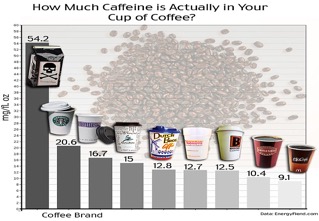The Only Guide for Understanding Stimulants: Caffeine Addiction & Abuse - The

The Only Guide to How dangerous are energy drinks? - Addiction Helper
What is caffeine? Caffeine is the stimulant in your coffee, tea, chocolate and soda that lowers tiredness, increases awareness and provides you an increase of energy. It can likewise cause sleeping disorders, headaches, dehydration and high blood pressure, if you're not careful. For many, caffeine is a tool to assist them get up, perk up and concentrate.

Blame capitalism for your caffeine addiction - The Signal
Caffeine is a white, bitter compound that's discovered naturally in over 60 plants, including coffee beans, tea leaves and cacao pods that are utilized to make chocolate. The U.S. Fda (FDA) thinks about caffeine to be both a food additive and a drug. The amount of caffeine in your food and beverage differs.

CAFFEINE ADDICTION RECOVERY MONTH - October - National Day Calendar
Coffee can have as low as two milligrams of caffeine (decaf coffee) per cup, and as much as 200 milligrams per cup. Your common tea has about 40 milligrams of caffeine, however it can range from nine to 110 milligrams. Twelve ounces of soda pop/soft beverage generally has 30 to 60 milligrams of caffeine.
What effect does caffeine have on the body? Caffeine enters your bloodstream from your stomach and small intestinal tract. As soon as in your blood stream, caffeine promotes your central nerve system your nerves, brain and back cable to make you feel more awake and alert. Caffeine reduces tiredness and enhances focus and concentration.
Some Known Details About How to Kick Your Caffeine Addiction and Actually Enjoy Your

When you drink or consume caffeine, the dopamine signaling in your brain is enhanced. Dopamine is a chemical that assists with controlling motivation, emotions and movement. You feel more alert and awake when the signaling boosts. Just how much caffeine is excessive? The typical American adult consumes 200 mg of caffeine a day.

8 Tips for Quitting Caffeine in Addiction Recovery - Origins Behavioral HealthCare
Taking in as much as 400 mg or four cups of coffee does not cause issues for many people. But, caffeine affects individuals in a different way, depending upon their size, gender and sensitivity to it. If you're delicate to caffeine, even moderate amounts can cause sleeping disorders (difficulty sleeping), quick heart rate, stress and anxiety and sensations of restlessness.
What are the signs of having too much caffeine? Symptoms of having too much caffeine might include: Headache, anxiousness, dizziness. Having "the jitters" or feeling shaky. Insomnia or sleep that is "on and off" throughout the night. Racing Caffeine Addiction Help or irregular heart beat. Boost in high blood pressure. Dehydration. Who should avoid caffeine? It's not safe for everybody to have caffeine in their diet.
